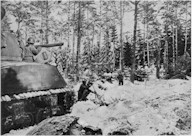Huertgen Forest
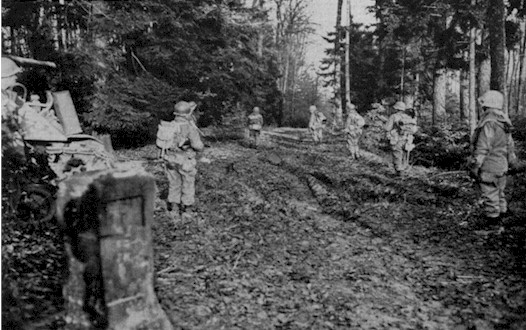 On 5 December, the 83rd Division relinquished its positions along the Moselle Valley to the 22nd Infantry of the 4th Division. The 83rd was to trade places with the 4th Infantry, which was badly in need of a rest and refit. The next day
they left by truck and traveled 185 miles north to the Huertgen Forest, just southwest of Aachen to relieve the 12th Infantry. The Huertgen Forest is about twenty miles long and ten miles wide. The forest is accented with steep gorges and winding slopes covered with thick layers of evergreens and firs. This heavy foliage made it too easy for a soldier to get lost in the woods, and many did. After a six-hour truck ride through freezing temperatures the division arrived at
On 5 December, the 83rd Division relinquished its positions along the Moselle Valley to the 22nd Infantry of the 4th Division. The 83rd was to trade places with the 4th Infantry, which was badly in need of a rest and refit. The next day
they left by truck and traveled 185 miles north to the Huertgen Forest, just southwest of Aachen to relieve the 12th Infantry. The Huertgen Forest is about twenty miles long and ten miles wide. The forest is accented with steep gorges and winding slopes covered with thick layers of evergreens and firs. This heavy foliage made it too easy for a soldier to get lost in the woods, and many did. After a six-hour truck ride through freezing temperatures the division arrived at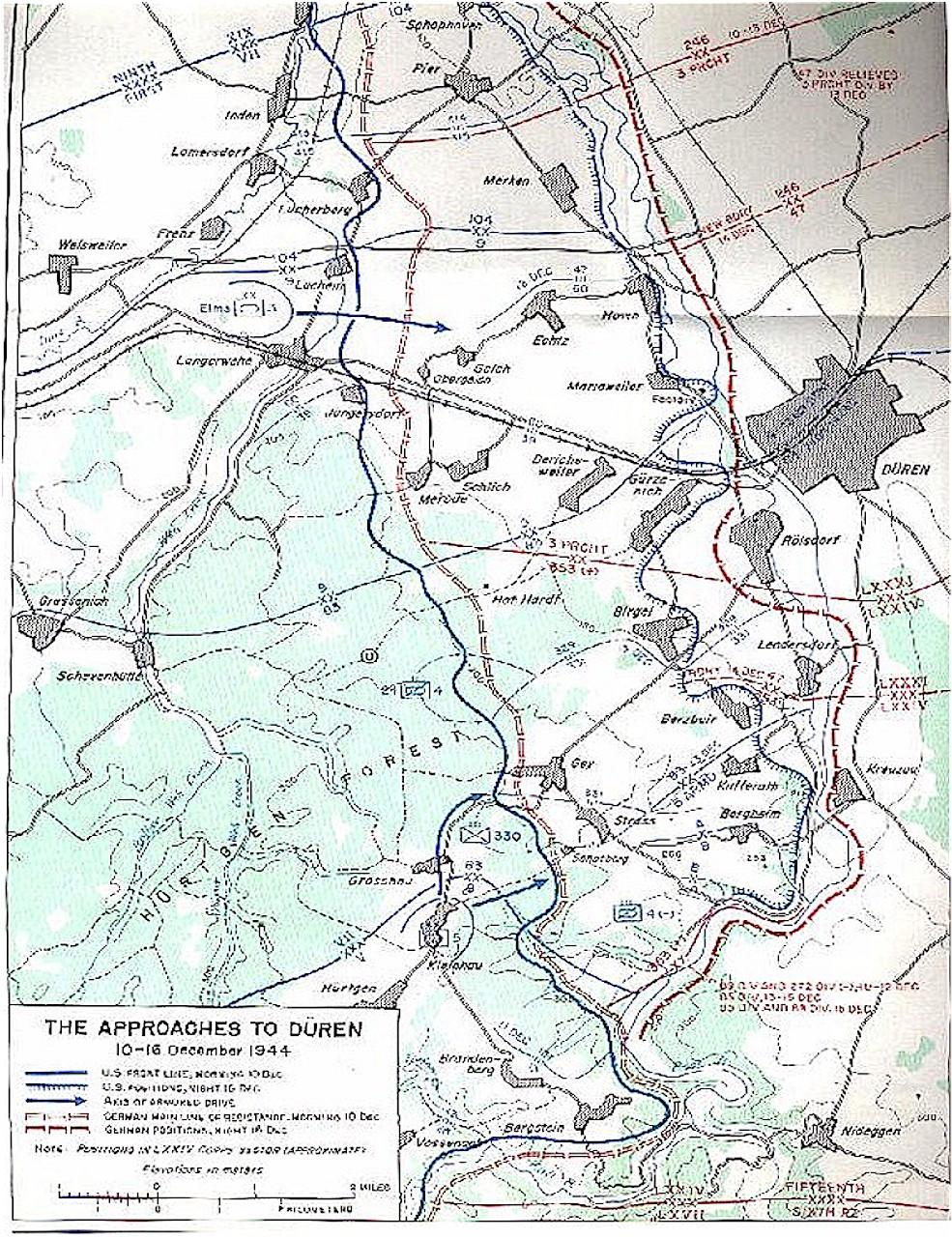 Gressenich, Germany at 1900 hours. The next morning the 331st Infantry moved up to begin relieving the 12th Infantry of its positions on the line. This took place all day and was completed by 1600. Unknown to the men of the 83rd at the time, eight divisions had lost more than of 22,000 casualties in the forest during the previous two months.
The Huertgen was fanatically defended by some of the most experienced troops Germany had, in an effort to push to Americans out of Germanys doorstep. Two crack divisions of the
47th
Volksgrenadiers and the 353rd
Infanterie Division opposed the G.Is, even some paratroopers of the 3rd
Fallschirmjager Division, were dug in just a few yards of their foxholes. In Addition, the move changed the divisions leadership from General Middletons VIII corps back to General Collins VII Corps. The 83rds new mission was to hold the positions they had just taken over. With the 330th on their right, and the 329th on the left, the division settled in. The Germans already knew the 83rd was coming and greeted the newly arrived division with leaflets fired from artillery shells, which read:
Gressenich, Germany at 1900 hours. The next morning the 331st Infantry moved up to begin relieving the 12th Infantry of its positions on the line. This took place all day and was completed by 1600. Unknown to the men of the 83rd at the time, eight divisions had lost more than of 22,000 casualties in the forest during the previous two months.
The Huertgen was fanatically defended by some of the most experienced troops Germany had, in an effort to push to Americans out of Germanys doorstep. Two crack divisions of the
47th
Volksgrenadiers and the 353rd
Infanterie Division opposed the G.Is, even some paratroopers of the 3rd
Fallschirmjager Division, were dug in just a few yards of their foxholes. In Addition, the move changed the divisions leadership from General Middletons VIII corps back to General Collins VII Corps. The 83rds new mission was to hold the positions they had just taken over. With the 330th on their right, and the 329th on the left, the division settled in. The Germans already knew the 83rd was coming and greeted the newly arrived division with leaflets fired from artillery shells, which read:
.
Welcome to the men of the 83rd Infantry Division
Well. Guys, things were going pretty well for in the past
Life was so nice and quiet in the Treves area, you hardly realized
There was a war going on, whilst you filled your fat bellies with
good grub and dreamt of a speedy return to your sweethearts back
in the states.
Now, some old brass hat has made you a damnable X-mas present by
Transferring you to the famous Aachen sector where the fight is
harder than any where else. Its all woods here- they are cold slippery and dangerous, death awaits you behind every tree.
Fighting in the woods is hellish. The 28th, and 4th Div. Have had their experiences, now it,s your turn.
You better write a last letter to your dear one whilst the going is still good. Tommorrow it may be to late, unless you have the good luck to become a P.O.W
..
The men of B Company attempted to orient themselves to their new surroundings, but the Germans had a welcome of their own in mind. As soon as the men settled in the Germans fired a short artillery barrage that caught some of the men out in the open. A total of 10 men were either wounded or killed.
GEY, GERMANY
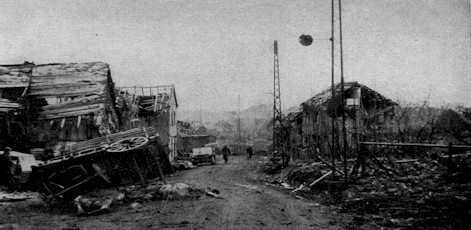
 December 10th, 1944 would start the battle for Gey. Gey was a strategic town located at the outskirts of the Huertgen forest. Its situated in a valley through which all roads leading from the forest intersect. Gey was a lynchpin in the Germans network of defenses. It was fortified to protect the vital approaches to Duren. The Enemy was determined to hold on to the town. They had set up several strong points complete with heavy machine guns inside
pillboxes and bunkers. Serpentine and Barbed wire lay strewn about with tin cans attached to warn of attacks. Blockhouses and roadblocks were located in strategic locations. Every house was an arsenal with ammunition stacked at each window. The approaches and roads leading up to the town were laced with mines, and booby traps were everywhere.
December 10th, 1944 would start the battle for Gey. Gey was a strategic town located at the outskirts of the Huertgen forest. Its situated in a valley through which all roads leading from the forest intersect. Gey was a lynchpin in the Germans network of defenses. It was fortified to protect the vital approaches to Duren. The Enemy was determined to hold on to the town. They had set up several strong points complete with heavy machine guns inside
pillboxes and bunkers. Serpentine and Barbed wire lay strewn about with tin cans attached to warn of attacks. Blockhouses and roadblocks were located in strategic locations. Every house was an arsenal with ammunition stacked at each window. The approaches and roads leading up to the town were laced with mines, and booby traps were everywhere.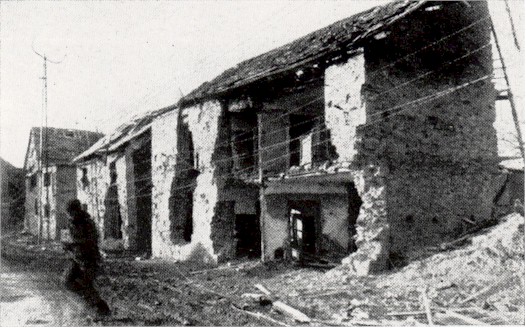 The town was completely smashed from artillery fire, every tree was shattered, every building damaged or collapsed, offering excellent defensive positions. Scattered debris and the corpses of animals and men killed littered the surrounding fields and streets. The weather was of no help, the conditions were miserable. Ice-cold freezing rain soaked the G.Is and the temperatures plummeted into the teens. Trench foot was a big problem. The Germans were well entrenched in their positions and determined to defend it. Assisting the 331st Infantry in the assault were the tankers of the 629th Tank destroyer Battalion, 774th Tank Battalion, and the 908th Field Artillery Battalion would supply artillery support. On December 9th in preparation for the next mornings assault the Regimental Mine and A&P platoons located and diffused many mines made attempts to repair the badly deteriorated roads leading into the town. While the engineers were doing their work several patrols probed the defenses of the town to gain an estimate of
The town was completely smashed from artillery fire, every tree was shattered, every building damaged or collapsed, offering excellent defensive positions. Scattered debris and the corpses of animals and men killed littered the surrounding fields and streets. The weather was of no help, the conditions were miserable. Ice-cold freezing rain soaked the G.Is and the temperatures plummeted into the teens. Trench foot was a big problem. The Germans were well entrenched in their positions and determined to defend it. Assisting the 331st Infantry in the assault were the tankers of the 629th Tank destroyer Battalion, 774th Tank Battalion, and the 908th Field Artillery Battalion would supply artillery support. On December 9th in preparation for the next mornings assault the Regimental Mine and A&P platoons located and diffused many mines made attempts to repair the badly deteriorated roads leading into the town. While the engineers were doing their work several patrols probed the defenses of the town to gain an estimate of
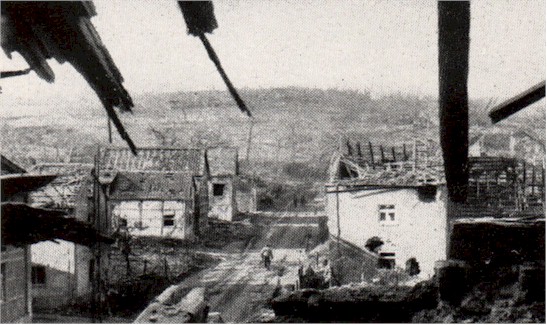 the forces opposing them. At 2200 hours the 2nd battalion sent a patrol out to reconnoiter the path into Gey in preparation for the assault the next morning. The patrol ran into a machine gun bunker and when they investigated it found the occupants to be asleep. When the patrol returned to make its report, the Company C.O. then sent them back out to destroy the bunker. After the men successfully destroyed the bunker the assault began. At 0500 just before daylight 2nd battalion launched their attack into Gey. The attack was immediately met by small arms, mortar, and artillery fire. . E and F companies advanced up to the center of the towns cross road, occupying the houses on both sides of the main thoroughfare. German artillery fire increased throughout the day as the men cleared out the houses one by one.
105 and 88mm shells exploded throughout the town and many men were hit with flying shrapnel. By nightfall the 2nd battalion had claimed about a third of the town
the forces opposing them. At 2200 hours the 2nd battalion sent a patrol out to reconnoiter the path into Gey in preparation for the assault the next morning. The patrol ran into a machine gun bunker and when they investigated it found the occupants to be asleep. When the patrol returned to make its report, the Company C.O. then sent them back out to destroy the bunker. After the men successfully destroyed the bunker the assault began. At 0500 just before daylight 2nd battalion launched their attack into Gey. The attack was immediately met by small arms, mortar, and artillery fire. . E and F companies advanced up to the center of the towns cross road, occupying the houses on both sides of the main thoroughfare. German artillery fire increased throughout the day as the men cleared out the houses one by one.
105 and 88mm shells exploded throughout the town and many men were hit with flying shrapnel. By nightfall the 2nd battalion had claimed about a third of the town
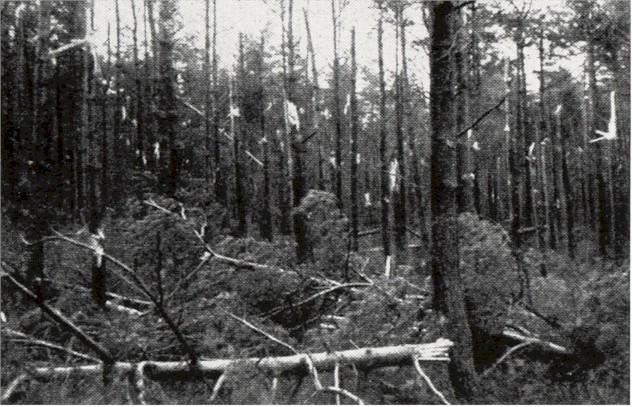 capturing 36 prisoners while losing 52 of their own. That night the GIs anticipated a counter-attack but none came instead the Germans threw a heavy mortar and artillery barrage down on them. At 0630 the next morning the tankers of the 774th attempted to enter the town to assist the 2nd Battalion, but the roads were heavily mined which stopped their progress. Company G came in from the south while Company A circled around and attacked from the east. After more house-to-house fighting, an effort hampered by the mines and booby traps, the 2nd battalion and A company from the 1st battalion secured the southern half of the town. Fighting in the
town went on all-day and all-night and continued into the early morning.3rd battalion was committed to the attack and relieved the 2nd battalion. On December 13th Uncle Rollands B
capturing 36 prisoners while losing 52 of their own. That night the GIs anticipated a counter-attack but none came instead the Germans threw a heavy mortar and artillery barrage down on them. At 0630 the next morning the tankers of the 774th attempted to enter the town to assist the 2nd Battalion, but the roads were heavily mined which stopped their progress. Company G came in from the south while Company A circled around and attacked from the east. After more house-to-house fighting, an effort hampered by the mines and booby traps, the 2nd battalion and A company from the 1st battalion secured the southern half of the town. Fighting in the
town went on all-day and all-night and continued into the early morning.3rd battalion was committed to the attack and relieved the 2nd battalion. On December 13th Uncle Rollands B
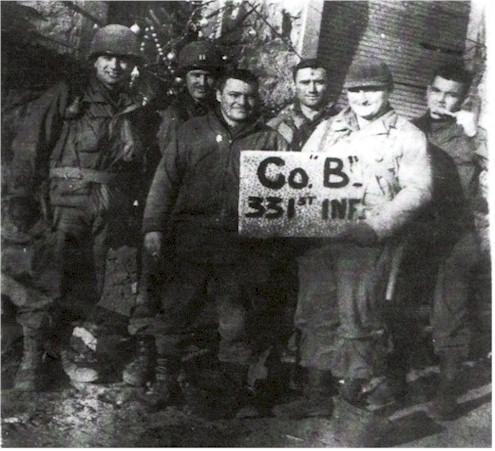 Company attacked from the east and by 1225 had reported the town cleared of all enemy resistance. With the 5th Armored to the south, and the 2nd and 3rd battalions holding the southern and western halves of the town, and the 1st battalion attacking from the east, and circling around to the north, the Germans had nowhere to go, so they surrendered. The battle for Gey was over and the 331st regiment added another 285 prisoners to its total with a loss of 265 killed, wounded and missing. Once Gey was secured the regiment continued its push east securing the high ground towards Duren, capturing the towns of Berzbuir and Lendersdorf.
Company attacked from the east and by 1225 had reported the town cleared of all enemy resistance. With the 5th Armored to the south, and the 2nd and 3rd battalions holding the southern and western halves of the town, and the 1st battalion attacking from the east, and circling around to the north, the Germans had nowhere to go, so they surrendered. The battle for Gey was over and the 331st regiment added another 285 prisoners to its total with a loss of 265 killed, wounded and missing. Once Gey was secured the regiment continued its push east securing the high ground towards Duren, capturing the towns of Berzbuir and Lendersdorf.
Meanwhile events over at the 329th area began to pick up. On December 12th the 329th launched its first
assault towards the edge of the Huertgen forest and close up on the Roer River. The 1st battalion captured Hof Hardt, while 2nd battalion cleared a nest of machine gun emplacements and secured the area around Hof Hardt. The next two days the regiment assaulted the towns of Gurzenich and Birgel. 1st and 2nd battalion jumped off at 0800 with 3rd battalion following at 0830. After negotiating heavily wooded terrain and light resistance the 2nd battalion entered Gurzenich, and by late afternoon were more than halfway through it. The battalion settled down and prepared to hold their gains for the night. The 1st battalion encountered stiffer resistance on their assault. After being held up by machine gun nests for most of the day they fought their way to the edge of Gurzenich before nightfall.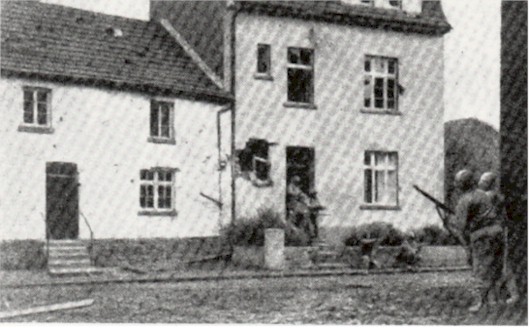
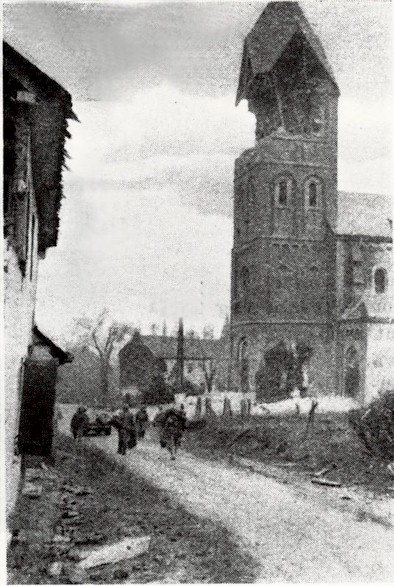 The 3rd battalion was not as lucky as the other two battalions. They encountered the stiffest resistance that day and had to out flank the enemys positions. That night the 308th engineers were busy clearing mines from the road from Hof Hardt in order to allow some armor to assist in the attack. The next day the 3rd battalion was given the task of taking the town of Birgel. After sweeping through the woods leading up to the town, the battalion had to cross an open field 500
yards long from the edge of the forest to the edge of the town. At 1430, after an artillery barrage pasted the town, Lt.
Col. Speedies 3rd battalion jumped off. They were immediately met with a hail of small arms and mortar fire. After a quick advance across the field they made it to the edge of the town. Meanwhile the 2nd battalion was clearing the remainder of Gurzenich.
The 3rd battalion was not as lucky as the other two battalions. They encountered the stiffest resistance that day and had to out flank the enemys positions. That night the 308th engineers were busy clearing mines from the road from Hof Hardt in order to allow some armor to assist in the attack. The next day the 3rd battalion was given the task of taking the town of Birgel. After sweeping through the woods leading up to the town, the battalion had to cross an open field 500
yards long from the edge of the forest to the edge of the town. At 1430, after an artillery barrage pasted the town, Lt.
Col. Speedies 3rd battalion jumped off. They were immediately met with a hail of small arms and mortar fire. After a quick advance across the field they made it to the edge of the town. Meanwhile the 2nd battalion was clearing the remainder of Gurzenich.
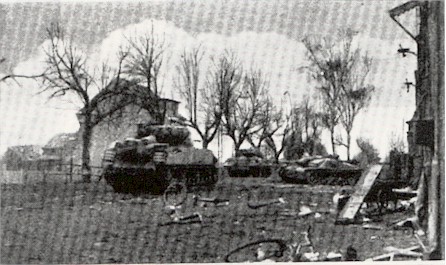
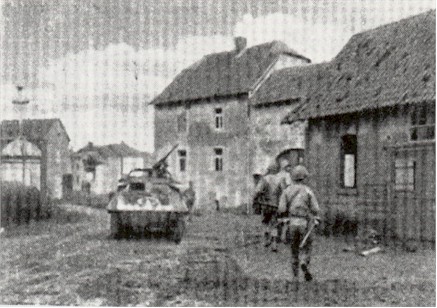 After capturing a large amount of prisoners they had the town secured except for a small section in the northeast. The Germans counter attacked later that afternoon but with no success. The next day on the 16th of December both towns of Gurzenich and Birgel encountered fierce German counter attacks.
The Germans threw everything at them tanks, infantry, and artillery support. However, the 329th held its ground and repulsed the counter attacks. On the 17th the 1st and 2nd battalions formed a pincer movement on Rolsdorf and captured the town. On December 18th the 83rd division dug in and consolidated their positions after an increase in enemy activity, it was unknown to the men at the time, but the Battle of the Bulge had just started.
After capturing a large amount of prisoners they had the town secured except for a small section in the northeast. The Germans counter attacked later that afternoon but with no success. The next day on the 16th of December both towns of Gurzenich and Birgel encountered fierce German counter attacks.
The Germans threw everything at them tanks, infantry, and artillery support. However, the 329th held its ground and repulsed the counter attacks. On the 17th the 1st and 2nd battalions formed a pincer movement on Rolsdorf and captured the town. On December 18th the 83rd division dug in and consolidated their positions after an increase in enemy activity, it was unknown to the men at the time, but the Battle of the Bulge had just started.
* The battle for the Huertgen Forest is considered part of the Rhineland
campaign.
Click here for the next page: Battle of the Bulge
